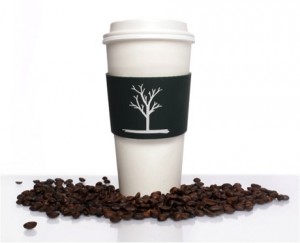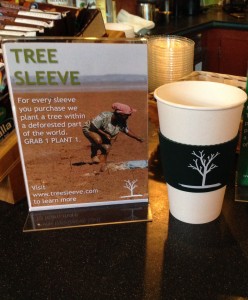Local Entrepreneur Brings Social Benefits to Coffee Sales with Innovative Product
/
It took root when he was a 9-year-old earning nickels and dimes at the Hartford Regional Market, gained impetus at Hartford High School and was cultivated at the University of Richmond. By the time Ray Fraser graduated college in 2011 with a business degree in marketing and finance, he was convinced that his life’s work would not center solely on making a profit, but on simultaneously making the world a better place. He’s doing just that, one tree at a time.
With a relentless work ethic and an engaging, easy-going personal style, Fraser’s start-up business – growing rapidly in just a few months – is called Tree Sleeves. His mission: to produce and sell reusable cup sleeves that combine comfort and utility with charity – “to help eradicate the cycle of deforestation affecting our planet.”
For every Tree Sleeve sold, a tree is planted in a part of the world affected by deforestation. It is a simple but profound concept, and the reaction has been overwhelmingly positive from a rapidly growing roster of retailers and consumers. With a retail price of only $2.00 - a Tree Sleeve is perfect for daily use while on the go, quite affordable, and reusable.
Fraser has never shied away from challenges – in fact, he has consistently sought them out since he first visited the local Regional Market and asked what he could do to earn some money. Told he needed to dump some boxes, he did – and came away with a nickel for his efforts. Thus began a working relationship – and first-hand glimpse of what it takes to succeed in business – that continued as a part-time job through high school. (The pay improved somewhat over time.)
As a teenager, Fraser was an Eagle Scout (his Eagle project was organizing a blood drive accompanied by a canned food drive for a homeless shelter) and an athlete who excelled in football, wrestling and track. He discovered a knack – and enjoyment – in working with people, as well as an aptitude for business. He would be the first in his family to attend college, encouraged by his parents, a machinist and teacher who resettled in Hartford from the West Indies and took education and diligence seriously. Missing a day of sc hool for being sick, Fraser recalls, was simply not an option.
hool for being sick, Fraser recalls, was simply not an option.
In college, he developed an affinity for brands with a cause, and in addition to working as a Resident Assistant on campus, had motivating internships with United Technologies in Connecticut and Saks Fifth Avenue in New York City. Both would express interest in hiring him after graduation, but by senior year Fraser had decided to chart his own entrepreneurial path, the example of Tom’s Shoes founder Blake Mycoskie (the subject of a college research paper), among others, serving as his frame of reference.
“I had looked at the corporate ladder,” Fraser recalled recently, “and I wanted to have a bigger impact, to do more than just bring home a paycheck. I wanted to expand my mind, and make a difference.”
 Innovative Idea
Innovative Idea
After graduating from college and returning to Hartford, Fraser tried to develop an entrepreneurial business with friends that didn’t quite come together, stymied by software development issues. Then one day in January, in a local Starbucks working on elements of that initial attempt at enterprise, the frequency which employees needed to empty trash cans overflowing with disposable cardboard sleeves caught his attention, and imagination. He thought there must be a better way, and then went about inventing it.
“They’d empty the trash, and then two hours later they’d do it again. The waste was astronomical. When I looked into the numbers on paper sleeves, I was shocked. We throw away 3 billion a year,” he emphasized. “That translates into thousands of trees cut down needlessly each year.”
The traditional disposable cardboard cup sleevemakes carrying easier and holding the cup possible by providing an extra barrier to reduce the heat from the cup. Based on his extensive and resolute research, Fraser has done the disposable cup holder one better, with purpose.
It didn’t happen overnight. He visited local coffee shops to talk to owners about their business, customers, and interest in a potential product. He had informal conversations with friends, inquiring whether they’d buy a reusable sleeve, and what attributes would make it attractive. (Being good for the environment was a recurring theme.) He scoured the internet in search of potential manufacturers, first in this country, then overseas. He taught himself about nations that produce coffee, and learned of the challenges many face due to deforestation.
 Building A Business
Building A Business
Fraser carefully nurtured relationships, engendering trust and crafting a business that he sees as having limitless potential – and enduring impact. He developed and produced an attractive, lightweight design made of 100% food grade silicone, a reusable sleeve that makes going green easy.
Research completed and initial business relationships established, it was time to take a leap of faith. With initial start-up funds borrowed, the 24-year-old ordered 1,000 silicon sleeves in July. He was quite optimistic that he would be able to sell them to retailers. But not certain.
After printing some promotional signs from his computer, buying handful of baskets at the local dollar store and a fistful of rubber bands at an office supplies store, Fraser set out to area coffee shops, bundles of product in hand.
One of the coffee shop owners he visited months previously to engage in speculative conversation was not surprised when he returned with a well-produced product – but he didn’t necessarily expect he’d be back.
“He was a nice polite young man, but I didn’t know that he’d actually do something. We try to encourage renewables, so I thought I’d buy some, and if people liked the idea, they’d buy it,” said Bill Sze, owner of Jojo’s Coffee Roasting Company, with locations in Hartford and New Haven. His initial order was for 100, this summer. “I’ve been going through them at a good rate. Most people like the idea.” Sze just re-ordered, another 100 for each location.
Within a couple of months, Fraser – pounding the pavement and meeting with coffee shop owners – had Tree Sleeve locations grow from a handful, to a dozen, to now nearly 30. By late October, he ordered the second batch of 1,000 to be manufactured, and continues to visit coffee shops personally, extolling the virtues of a product that allows purchasers to impact the planet, and people’s lives.
Along the way, he has patched together an informal set of advisors, including two of his former professors at Richmond, two volunteers from the Hartford chapter of SCORE (Senior Corps of Retired Executives), a local marketing professional that he learned of through CT NEXT, and a growing array of local coffee shop owners willing to give the product a try.
Another of the initial locations, J. Rene Coffee Roasters in West Hartford Center, has also re-ordered in recent weeks, based on solid sales. Current locations include Avon, Stamford, Windsor, New Haven, Middletown, and Shelton. But Fraser’s sites are set on a broader reach, and impact.
Having An Impact
The initial tree planting is being handled by Eden Reforestation Projects. Since 2005, the California-based Eden has employed thousands of workers in Ethiopia, Madagascar, and Haiti who have planted millions of seedlings that are growing into healthy forests. They will be planting trees quarterly for Tree Sleeves, and Fraser now looks forward to 2,000 trees being planted in December.
Eden’s website explains that radical deforestation is a major cause of extreme poverty and oppression in impoverished nations, and that deforestation, which can result in soil erosion and destructive flooding, contributes to the climate change crisis.
The local start-up company’s slogan of “Grab 1 Plant 1” is quite concise: GRAB 1 - customers purchase tree sleeves and the company provides the necessary funding to a non-profit tree planting partner; PLANT 1 - Tree Sleeve's nonprofit partner plants and nurses tree seedlings in greenhouses located within deforested parts of the world. Upon maturity, trees are then transported and planted in areas most affected.
With patent pending, Tree Sleeves are currently manufactured overseas, but Fraser hopes that as the business grows he will be able to bring manufacturing to the U.S., while keeping prices affordable for consumers and continuing to impact the environment and vast populations. Not unexpectedly, he is optimistic. “Our generation wants to make a difference. Impact is huge for me, and this is a huge issue. I want to be the one who helps to solve it.”
Always looking ahead, co-branding, college stores and internet sales may be on the horizon, Fraser says, and perhaps a college intern to provide support. Right now, to help pay for the gas his car requires to get him around the region, Fraser is working an overnight job at a local warehouse distribution center while building his own business by day.
Don’t even ask when he manages to sleep -that’s not a priority. Fraser has been taking samples of Tree Sleeves to retailers since early summer, shows no sign of slowing down, and is encouraged by the response. He’s also quite proud to be launching his business in the city where he grew up. “It feels good. I went away to school, I came back. We certainly have the resources here to get this off to a great start.”































